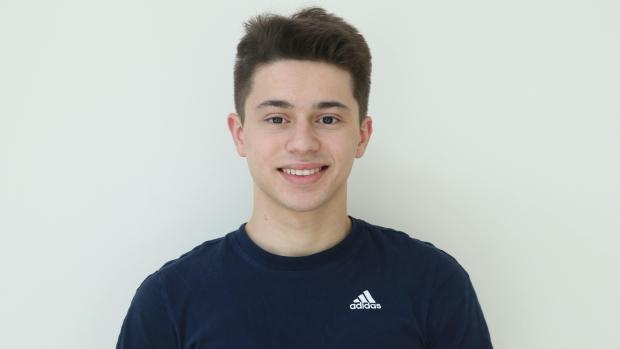From the Undergraduate Summer Research Program to a Rhodes Scholarship

Undergraduate Uljad Berdica won a Rhodes Scholarship for research done in Assistant Professor Chen Feng's AI4CE Lab
Uljad Berdica is fond of a quote from Alfred North Whitehead, the author of the 1911 volume An Introduction to Mathematics: “Civilization advances by extending the number of important operations which we can perform without thinking about them,” Whitehead wrote, and that sentiment has deeply informed Berdica’s own work and goals. “I want to make things easier for other researchers by creating tools that will allow them to do their jobs more efficiently,” he explains, “and to help spark new paradigms and ideas.”
Later this year he’ll be furthering that mission at Oxford University thanks to winning a Rhodes Scholarship, a prestigious award offered each year to only about 100 students from around the globe.
“Uljad is an NYU Abu Dhabi student who has worked with my research group here at NYU Tandon since 2020, both remotely and in-person,” Assistant Professor Chen Feng says. “I am not surprised that he has received an honor as rare and coveted as the Rhodes given the quality of his research.”
Chen’s lab seeks to advance fundamental automation and intelligence technologies like robot vision and machine learning, while addressing the challenges of applying them to civil and mechanical engineering domains, and Berdica’s work there included a 2020 project to improve the process of mobile 3D printing, an emerging technology that overcomes the inherent disadvantages of classic static 3D printing. “Simulating manufacturing processes has become increasingly necessary, as they provide a systematic study of the possible issues and help minimize costs,” Berdica explains. “And simulating the process of 3D printing various types of materials and the integrity of the resulting structure is of paramount importance. Our work aims to combine existing simulation software with remeshing algorithms and more efficient integration schemes to optimize computational cost and provide a useful tool for future development.”
The project, done as part of Tandon's Undergraduate Summer Research Program, which invites NYU students from campuses around the world to do high-level research in faculty labs, led to a publishable paper, “Mobile 3D Printing Robot Simulation with Viscoelastic Fluids,” which Berdica and his coauthors presented at the 2021 IEEE/RSJ International Conference on Intelligent Robots and Systems (IROS).
Berdica — whose other areas of interest include algorithms for neuroimaging, the modeling of various biophysical processes, sensor programming for biomimicry, and microfluidics and full chain development of Point-of-Care medical devices--next collaborated with Chen on a project involving a neural network method for detecting dendritic spines, small protrusions in which most synapses are formed, making them major sites of structural changes in the brain and a possible key to understanding brain functions like memory formation and sensory refinement.
“Ultimately,” Berdica says, “I hope my work will be useful to those studying not just 3D printing and medical annotation, but a host of other topics.”

